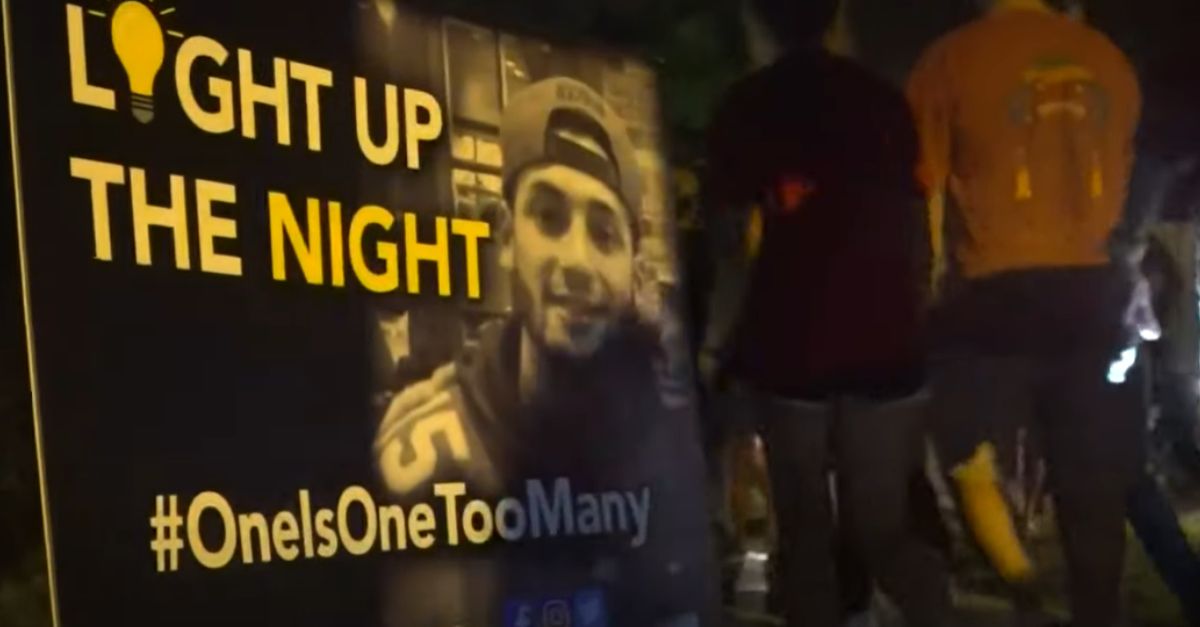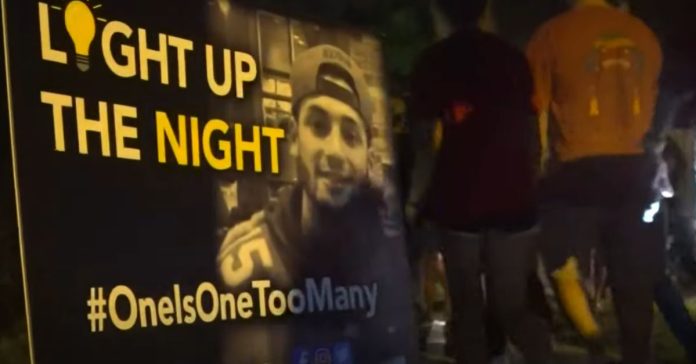
Scenes from a vigil for slain student Chase Meola (YouTube screengrab from Ohio CBS affiliate WBNS).
Though a federal judge deemed the shooting death of college student Chase Meola outside of a student party “tragic,” his family’s quest to hold a university and fraternity in Ohio liable for his slaying was nevertheless rejected this week.
Chief U.S. District Judge Algenon Marbley, an appointee of former President Bill Clinton, dismissed the civil wrongful death case first brought by Chase Meola’s father, Paul Meola, in 2022, against Ohio State University and the unsanctioned, off-campus Phi Kappa Psi Fraternity Inc.
“While there can be no doubt that Mr. Meola’s murder was tragic, there are no grounds for a legal wrongful death action in this case under the standard set by § 2125.01. Even if Plaintiffs were able to provide evidence for each claim, Plaintiffs fail to state definitively whether Mr. Meola’s death occurred upon the real property of Defendants,” Marbley wrote.
Further, the university bore no “duty to warn visitors” to Ohio Delta Phi Psi House, like Chase Meola, that they could be frequenting a “high crime area that experience high level of violent and non-violent crimes.”
If such liability were to be sustained, it would mean that all property owners within the district where the university is located would be responsible for warning guests. That would be unfeasible under state laws as is and since the Phi Kappa Psi Fraternity is not an owner, lessee or person in control of the property where Meola was killed, it further wouldn’t apply.
Meola’s family would need to prove gross negligence or “wanton or reckless misconduct,” by the university and fraternity, but there was no pleading made in support of that either, Marbley found.
Paul Meola argued that because the landlord “knew” about crime in the area generally, they had been negligent by failing to provide security controls like guards, cameras, or other tools provided in conjunction with the Columbus Police Department to enhance safety in the area.
“This cannot be,” Marbley wrote, citing a liability finding in a California case involving a man who slipped and fell inside the shower of a public gym.
In that case, Marbley wrote, it was determined that “conduct demonstrating the failure to guard against or warn of, a dangerous condition typically does not rise to the level of gross negligence” and the same was true here.
To establish pain and suffering claims on behalf of Chase Meola, as the family has tried, they would need to prove the pain and suffering were experienced consciously.
In October 2020, Chase Meola left the house as he tried to get an uninvited guest, Kinte Mitchell, to leave the party and when he wouldn’t go, Mitchell shot him in the head. Mitchell, the Columbus Dispatch reported last September, admitted to the crime and was sentenced to serve 15 years in prison.
“Plaintiffs fail to produce any claim upon which, with the appropriate evidence, they could show that Mr. Meola experienced conscious pain and suffering as a result of the shooting by Mr. Mitchell … Plaintiffs later go on to allege that Mr. Meola ‘was forced to endure great conscious pain and suffering and emotional distress during the course of his encounter with Kintie [sic] Mitchell and his shooting, up until the moment he died.’ Again, there must be some evidence of conscious pain and suffering by the decedent between the injury inflicted and his resulting death,” Marbley wrote.
The family never sued Mitchell.
“While a weak argument may be made that Mr. Meola was an invitee to the party in a colloquial sense, he was not a ‘business invitee’ as defined by tort law. A ‘business invitee’ is defined as ‘one who is on the premises of another, by express or implied invitation, “for some purpose which is beneficial to the owner,”” the opinion states.
Attorneys for the Meolas nor the university immediately returned a request for comment Wednesday.
Have a tip we should know? [email protected]

